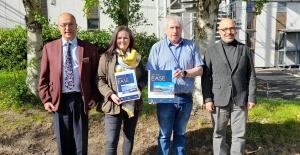AFBI and the Loughs Agency have published a new report focusing on the sustainable management of aquatic resources. The report, entitled The Enhanced Application of the SMILE Ecosystem Model to Lough Foyle (EASE), builds on a modelling approach linking land use to sea lough ecosystem models.

EASE was delivered as a follow-on study from work developed for an ecosystem modelling framework developed for carrying capacity assessment in 5 sea loughs around Northern Ireland’s coast. The SMILE project (https://longline.co.uk/smile) focused its efforts on Belfast Lough, Strangford Lough, Carlingford Lough, Lough Foyle, and Larne Lough.
The EASE report can be viewed here
In Lough Foyle, however, the modelling was applied in a simplified form, and it was therefore important to set up a more detailed simulation framework, similar to that applied in the other systems.
From 2010 onwards, the River Basin Management Plans mandated by the EU Water Framework Directive were in their second cycle, and the need for explicit coupling of land-based loading to estuaries and coastal waters was clear.
Although the SMILE application to Lough Foyle used a simplified approach to water circulation, it was the only one of the five systems where a hydrological model was applied to the catchment. This was the first use of the Soil and Water Assessment Tool (SWAT), developed by Texas A&M University, for carrying capacity assessment in Northern Ireland.
In the EASE study, the project team successfully applied this coupled modelling approach and demonstrated the benefits of including the SWAT model in a carrying capacity modelling framework. In particular, given the agricultural nature of the catchment providing a key tool for relating drivers, pressure, and state.
Latest news
- AFBI issues Nematodirus warning – Spring 2025 11 April 2025
- Managing Nature Based Risks to the UK Economy and Opportunities for Green Finance 08 April 2025
- AFBI Hillsborough host AERA committee 27 March 2025
- The Omics Days Conference 27 March 2025
